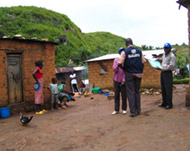Marburg cases increase in Angola
An outbreak of the killer Marburg virus, which has claimed 235 lives in northern Angola, is not over, with the number of cases and deaths continuing to rise.

World Health Organisation spokesman Dave Daigle said he did not think the deadly haemorrhagic fever outbreak was over. It has hit hardest in the war-ravaged town of Uige, the northern front between government and rebel forces during Angola‘s brutal 27-year war.
“The numbers are still going up,” Daigle said from Uige on Monday.
He said mobile teams sent out into the sprawling townships around the town to look for the sick and the dead were again encountering resistance from the town’s communities.
Security concerns
“We still have security concerns. Yesterday [Sunday] people threw stones at the teams who go out in the field,” said Daigle.
A team of top virologists, epidemiologists and anthropologists from the WHO and Medecins sans Frontieres (MSF, Doctors without Borders) arrived in the devastated town late last month, where the paediatric ward of the local hospital was fingered as the possible source of the Ebola-like outbreak.
 |
|
The deadly disease has struck |
Their efforts have been met with fierce resistance and denial by many residents, who are shunning the hospitals and the specially suited medical teams that roam the city in search of Marburg cases.
Daigle said efforts had been increased to mobilise the community to tell them about Marburg, which is spread through contact with bodily fluids including blood, urine, saliva, excrement, sweat, tears and vomit.
Musical message
“We have more people, about nine in the team, who work now on social mobilisation,” Daigle said, adding that a special song against Marburg, recorded by three local musicians last week and initiated by anthropologists, was being played around the town.
“The song is now on the radio and also on trucks with loudspeakers,” Daigle said.
|
“We have more people, about nine in the Dave Daigle, |
“Marburg, leave our people in peace. We are going to kick you out of this country,” goes the song in Portuguese.
The Marburg virus can kill a healthy person in a week by diarrhoea and vomiting followed by severe internal bleeding, and is not treatable with any known drugs.
The virus was first detected in 1967 when German laboratory workers in Marburg were infected by monkeys from Uganda.
Until now the most serious outbreak of the disease was in the Democratic Republic of Congo, where 123 people died between 1998 and 2000.